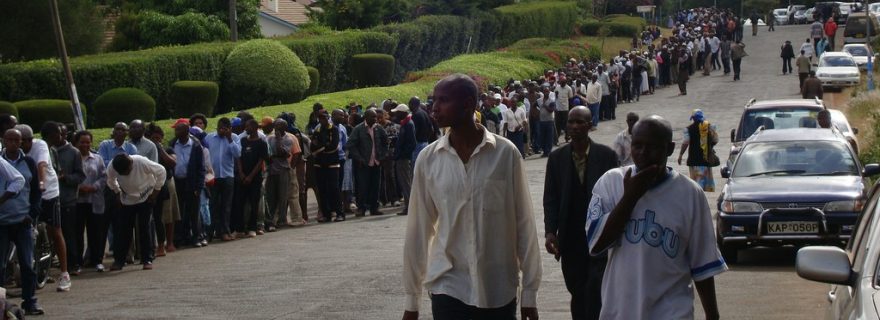My days as a cyborg: how I (temporarily) became the Kenyan elections
Between March 4 and 9 I lived in a vacuum. My sole companions were my laptop and my smartphone; together we merged into one grand news-consuming machine. Kenya was at the centre of my universe, the Kenyan elections my sole concern.
The vacuum
I experienced the Kenyan elections in the sanctuary of my office. I constantly checked online newspapers and surfed the web for updates while playing live broadcast streams in the background. My twitter account was permanently showing on my laptop as well as my smartphone, so as not to miss any of the tweets that came in almost by the second. The excitement I encountered all over the web proved it: I was not the only one doing this.
The elections had given rise to a cyber community that was keeping a close eye on all proceedings. We shared the burden of wanting to know what happened before it actually happened. We had never met in person and most likely we never would. But in the vacuum I felt connected. As with comrades, perhaps.
The bad memory
It surprised me that I was so absorbed; I don’t like to think of myself as an easy prey for whatever addiction, and yet this was taking the shape of one. An addiction. Of course the grip the elections had on me was closely related to previous experiences; Kenya’s last elections, held at the end of 2007, had turned extremely aggressive. I feared what would happen this time.
In 2007 violent clashes had continued for weeks until a coalition was formed between the election’s main winner Mwai Kibaki and his principal opponent Raila Odinga. By that time, according to the more modest statistics, more than 1,200 Kenyans had died and around 200,000 were left displaced. It left the country in a deadlock for years. Tourism diminished and international investors shied away. Just as Kenya started to get back on its feet, the government had served its term.
Same game, same players, different setting
These elections could potentially become very similar to those in 2007. Kenyan politics have been in the hands of just a handful of politicians for a long time. Alliances changed over the years; competitors became associates, and partners grew into rivals. But the top politicians in command remained the same.
Uhuru Kenyatta. Raila Odinga.
They had taken part in earlier elections, and both have nourished presidential ambitions for a long time. The general public feared that the 2013 elections might simply turn out to be another episode in longstanding rivalries.
And so we gathered around our radios, televisions, computers and smartphones, closely watching every movement. I became a cyborg; I miraculously fused with the devices that were to keep me updated, until nothing else mattered.
March 4 till March 9
My twitter account is doing overtime. On the #kenyadecides platform dozens of tweets pour in every minute. Now and then memorable pictures are shared: of extraordinary long queues leading to polling stations; of empty Nairobi streets where, on a normal day, one would have trouble to even catch a glimpse of the tarmac; of a graffiti street artist painting ‘PEACE WANTED ALIVE’ in large white letters on the capital’s pavement. And the same slogan is articulated time and again: please, let the elections proceed harmoniously. Please, let business as usual return as quickly as possible.
On Saturday 9, Uhuru Kenyatta was pronounced Kenya’s fourth president. No significant outbreaks of violence were reported; people had indeed remained calm. Raila did not accept the outcome and accused Uhuru of cheating. However, contrary to what happened in 2007, he presented this as a matter to be taken care of in court, not in the streets. Newspapers and television stations alike celebrated the victory.
My metamorphosis
Not long after, my twitter account went back to showing tweets on everyday events. The spell was broken and my temporary obsession finally made room for a more reasonable degree of curiosity about what was to follow. Like Kenyans, I was happy that business as usual returned. Nairobi’s streets slowly witnessed a return of the excessive traffic while I turned off my computer.
The hype of the day had evaporated.
As easily as our cyber community of election bystanders had emerged it collapsed again. Though I was as guilty as other deserters, it suddenly felt inappropriate. Voyeuristic. I had seized the agitation of a country and then I had distanced myself again, just as I pleased. There is something cruel about being a news-addicted cyborg.



0 Comments
Add a comment